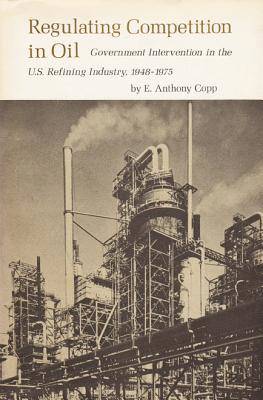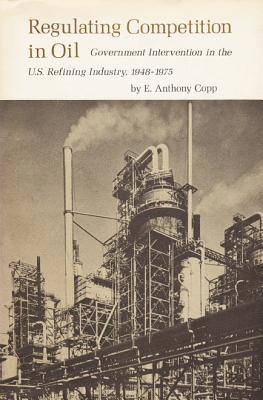
- Afhalen na 1 uur in een winkel met voorraad
- Gratis thuislevering in België vanaf € 30
- Ruim aanbod met 7 miljoen producten
- Afhalen na 1 uur in een winkel met voorraad
- Gratis thuislevering in België vanaf € 30
- Ruim aanbod met 7 miljoen producten
Zoeken
Regulating Competition in Oil
Government Intervention in the U.S. Refining Industry, 1948-1975
E Anthony Copp
€ 52,45
+ 104 punten
Omschrijving
The full cost of the failing energy policies of the United States can be measured by out vulnerability to the dictates of foreign oil-producing countries. U.S. government policy has traditionally been aligned in support of independent oil refiners against the dominance of refining by the major oil companies, with the intent of ensuring competition. At the same time, petroleum policies of the last quarter-century have been justified on grounds of the need for national energy security. Those combined national security and antimonopoly policies have resulted in unacceptably high costs and have only undermined the government's attempts to achieve any kind of long-term energy goals. Beginning with a thorough economic history and analysis of the refining industry's growth and structure, E. Anthony Copp shows how government import and domestic pricing policy has tended to subsidize the less economic sizes of independent refiners while reinforcing the market power of major refiners, thus failing to provide adequate additions to domestic petroleum proved reserves or to encourage more efficiency in refining capacity. The weakness of natural gas policies (which government has consistently failed to coordinate with national petroleum policy) and state prorationing and other policies since 1948 has also contributed to the current energy crisis. A major theme of this book is that with energy resource allocation now heavily weighted by government planning, the independents may not gain at the expense of the major oil companies, but more likely both groups will yield actual or potential market power to governments, both foreign and domestic. How well government and industry learn to alter this pattern will have great bearing on the success of this nation in filling its energy needs and in preventing or allaying a more severe energy crisis in the 1980's. Examining recent and current administration efforts at regulation, and the impact of OPEC's rise to world economic power on those policy efforts, the author presents ideas that should be considered in the development of a new national energy policy.
Specificaties
Betrokkenen
- Auteur(s):
- Uitgeverij:
Inhoud
- Aantal bladzijden:
- 308
- Taal:
- Engels
- Reeks:
- Reeksnummer:
- nr. 1
Eigenschappen
- Productcode (EAN):
- 9780890960141
- Verschijningsdatum:
- 1/12/1976
- Uitvoering:
- Hardcover
- Formaat:
- Genaaid
- Afmetingen:
- 162 mm x 234 mm
- Gewicht:
- 621 g

Alleen bij Standaard Boekhandel
+ 104 punten op je klantenkaart van Standaard Boekhandel
Beoordelingen
We publiceren alleen reviews die voldoen aan de voorwaarden voor reviews. Bekijk onze voorwaarden voor reviews.











